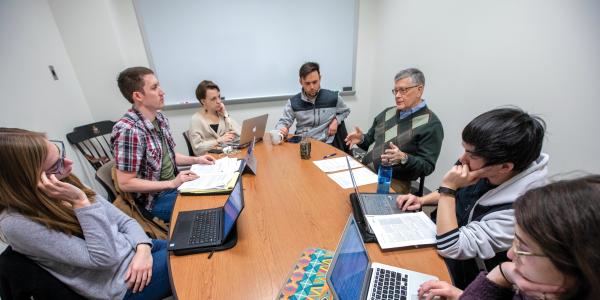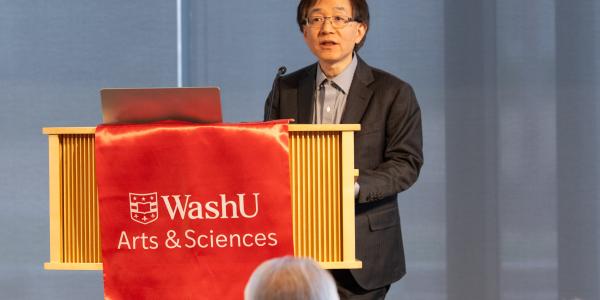The James S. McDonnell Distinguished University Professor retires from Arts & Sciences with a legacy of leadership in the field of memory science.

Like other retiring faculty members before him, Henry “Roddy” Roediger III, the James S. McDonnell Distinguished University Professor of Psychological & Brain Sciences, has many fond memories of his time at WashU. He also happens to have expert insight into how those mental images were created and stored.
Roediger built a remarkable career studying the psychology of memory, the fragile mental impressions we gather, cultivate, and discard throughout our lives. Over the decades, he propelled the field of cognition forward while helping develop WashU’s Department of Psychological & Brain Sciences, one of the most productive and vibrant psychology departments in the country.
The department hit its stride after Roediger became chair in 1996. During his eight years in the role, the faculty nearly doubled in size and their research expanded into new fields, including brain imaging. “It was a time when other psychology departments were shrinking, but we were able to hire some top talent,” Roediger said. “We really made a splash.”
The momentum has continued and, nearly 30 years after Roediger arrived, psychological and brain sciences has fully lived up to his original expectations. “Roddy’s tenure as chair was truly transformative,” said Jeff Zacks, the Edgar James Swift Professor in Arts & Sciences and current department chair. “He hired a lot of great people and provided exceptional mentorship to junior faculty. He also led by example, continuing his highly impactful research career while taking on major leadership and editorial roles in the field.”
Roediger’s work has made an impact in several areas of memory research. Just before Roediger arrived at WashU, he teamed with Kathleen McDermott to develop a paradigm that became popular in the study of false memories. He and McDermott, also a professor in the department, showed that people can easily develop false memories of hearing specific words when they hear a series of related words. For example, when people hear “bed, rest, awake, tired, dream,” they often remember the word “sleep” as having been presented in the list. The well-established phenomenon is now known as the Deese-Roediger-McDermott paradigm, or DRM.
Test your memory with Roediger’s DRM paradigm:
In 2017, Roediger was elected to the National Academy of Sciences, and he was chair of the psychology section of the American Association for the Advancement of Science from 2017 to 2020. He was elected president of the Association for Psychological Science in 2003. He twice served as Arts & Sciences’ dean of academic planning, most recently from 2013 to 2015. He currently serves as chair of the psychology section of the American Academy of Arts and Sciences.
Roediger is particularly proud of his work in the field of education. From 2003 to 2015, he was the lead investigator on a $8.7 million project funded by the James S. McDonnell Foundation that studied ways to apply research findings on memory and cognitive development to the classroom. Among other things, the team showed that testing can teach students how to access and retain information. “Students need to learn how to retrieve information, not just how to cram more information into their brains,” Roediger said. The project led to the book “Make It Stick: The Science of Successful Learning.” Co-authored by Mark McDaniel, professor emeritus of psychological and brain sciences, it has sold more than 1.5 million copies.
Of the courses he’s led over the years, Roediger most enjoyed “Introduction to Memory Studies” (Psychological & Brain Sciences 221), a first-year seminar he co-taught with friend and colleague James Wertsch, the David R. Francis Distinguished Professor who retired last year. The course explored memories created by individuals as well as collective memories of monumental events, such as World War II. “Collective memories help shape who we are as a people,” Roediger said, “but they are not uniform.”
Roediger will officially retire in June, but he’s unlikely to slow down. As a professor emeritus, he’ll continue research projects, focusing primarily on collective memory and education research. He is the co-principal investigator of an ongoing $90 million National Science Foundation project that is designed to innovate science education.
Whether he’s looking back or looking ahead, Roediger said he treasures his time at WashU. “I’ve been very fortunate to have so many amazing colleagues and talented students.”
Read about more Arts & Sciences faculty members retiring from WashU in Summer 2025. The story also appeared in the Spring 2025 issue of Ampersand magazine. See more stories from the magazine and browse our archives.





